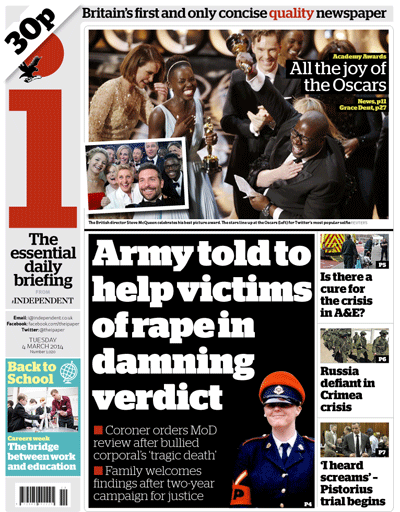i Foreign Editor's Letter: What next for Ukraine?

What next? That’s the rather obvious question facing the opposing sides in the stand-off in Ukraine.
In Western capitals, leaders are wondering quite how they address what can legitimately be called a land grab by Moscow. Russian troops are on the streets of many of Crimea’s major towns and cities and, to a large extent, have gained de facto control, but what can the EU, Nato, the US and everyone else who would like to see Russian power curbed do to redress the situation?
The truth is that there are very few options. Western governments have expressed support for Kiev’s new government and the language to describe Russia’s actions in recent days has become increasingly blunt. But in terms of actual action, there has been little.
Boycotting a G8 meeting or the Sochi Paralympics is one thing but it is not going to overly worry Vladimir Putin, especially when he is prepared to deploy troops to achieve his political ambitions. Sanctions have been hinted at, as have visa bans for specific individuals and the threat that Western businessmen and women might eschew trading with Russia. But these are pretty empty threats when one considers that there are now tens of thousands of Russian troops on the ground in Crimea. There is no suggestion whatsoever of any military adventure by the West.
And the threat of an economic response only goes so far. Sure, there are financial penalties that can be exacted on Moscow – Russia’s main stock exchange fell by more than 10 per cent in early trading on Monday – but a map of gas pipelines that feed Western Europe shows that Moscow can also play that game. Vast amounts of gas – which keeps the lights on in cities across Western Europe – flows from the fields of northern Russia through Ukraine and into power stations across the EU. He has the power to turn the lights off.
Mr Putin knows this only too well and, like other foreign policy objectives in recent months, has calculated that the West will actually do little when faced with aggressive action from Moscow. Mr Putin has been able to face down proposed military action in Syria, for example, because he knows that the West, and especially the Americans, does not really have the stomach for a fight.
All of which ultimately means that if Russia wants to absorb Crimea, and indeed other parts of Eastern Ukraine, rhetoric aside, there is little standing in its way.
Subscribe to Independent Premium to bookmark this article
Want to bookmark your favourite articles and stories to read or reference later? Start your Independent Premium subscription today.

Join our commenting forum
Join thought-provoking conversations, follow other Independent readers and see their replies